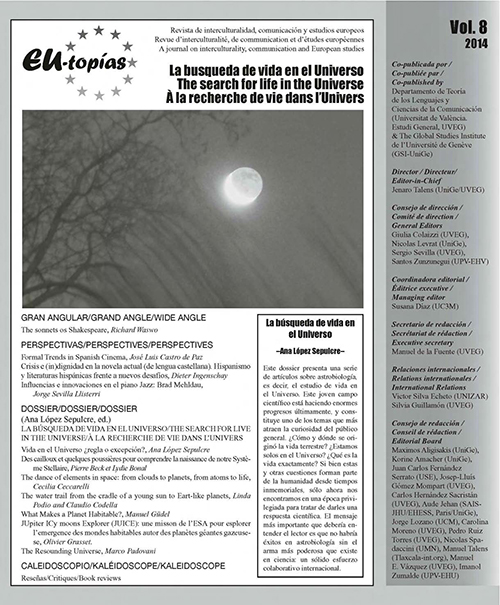The sonnets of Shakespeare
DOI:
https://doi.org/10.7203/eutopias.0.18770Keywords:
Shakespeare’s Sonnets, Petrarchist Tradition, Elisabethian Poetry Abstract
Abstract
The presentation of Shakespeare’s sonnets requires brief analysis of the tradition of sonnet collections, the unique text of Shakespeare’s version, the poetic form itself, and the major themes, both historical and original, of his version. The tradition of idealizing a courtly mistress descended from the oral performances of the Troubadours, rarified by the written works of Dante, and made fashionable throughout Europe by the Canzoniere of Petrarch. To ‘Petrarchize’ was in vogue on the continent from the early sixteenth century, but did not arrive in England until the last decade of it. By the time Shakespeare’s sonnets were printed in 1609, the fashion had expired, and had long been the subject of satire (indulged by the poet himself on the stage, for example, in As You Like It). The postures and metaphors had become trite and easily mockable. But the serious examination of the personal emotion that would later be called the ‘self’ remained in the tradition, philosophized by the great Italians, and available for development. Shakespeare developed it very casually, circulating some sonnets in manuscripts and paying no attention to their printed form (unlike his careful attention to the printing of his narrative poems, Venus and Adonis and The Rape of Lucrece). The sonnets were collected by an enterprising publisher and never reached a second edition (the vogue had indeed passed) until 1640. But the mastery of their form and different possible structural variations –both syntactic and prosodic– suggests attitudes far from casual. The inversion of the usual major themes suggests the same thing: the first 125 poems are addressed, not to a courtly dame, but to a young aristocratic man. The earliest poems are arguments that he reproduce –not the usual plea of seduction. The later poems are addressed to a woman, and concern the most brutal realities of sexual pleasure and betrayal. It seems clear that Shakespeare is deliberately playing with all the clichéd expectations of his literate audience– the lawyers and courtiers who flocked to and patronized his theatre. What he promises to the young man –never to the woman– is an original version of what Horace and Ovid promised to themselves: literary immortality, the power of spoken language to outlast time. This is his greatest subject, along with the examination of what the whole tradition provided: the moral psychology of love– of which Shakespeare remains our greatest analyst before, and maybe after, Freud.
 Downloads
Downloads
Downloads
Published
How to Cite
-
Abstract269
-
PDF75
Issue
Section
License
![]()
The authors conserve the copyright. All content published in EU-topías. Journal of interculturality, Communication, and European Studies are subject to the license Creative Commons Attribution-NonCommercial-ShareAlike 4.0 license. The full text of the license can be found at <http://creativecommons.org/licenses/by-nc-sa/4.0>
They may be copied, used, disseminated, transmitted and publicly displayed, provided that:
- The authorship and original source of the publication is cited (journal, publisher and URL of the work).
- They are not used for commercial purposes.
- The existence and specifications of this license of use are mentioned.
It is the responsibility of the authors to obtain the necessary permissions for images that are subject to copyright.



